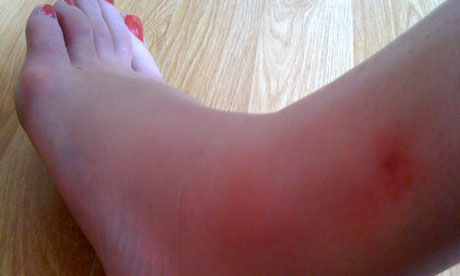
Arachnophobes, look away now. On Saturday evening, while at my friend's back-garden barbecue, I was bitten by a spider. I felt a sharp sting – like a needle piercing the skin – and shook my leg to rid myself of the offending creature, which scuttled away so quickly that I forgot to scream.
But the bite remained: a bloody, fang-shaped puncture, which the following day caused my ankle to swell to such a size that I am now unable to walk on it, and have been prescribed a seven-day course of antibiotics. Repeat after me: Ow, ow, ow!
"Only 10 species out of the 650 spider varieties in the British Isles actually bite," says Stuart Hine, an invertebrates expert at the Natural History Museum, when I ring him hoping to identify my assailant. And, he says, even those bare their fangs only very rarely – Hine sees around 50 spider-bite cases a year, most of which result in nothing worse than an itchy pinprick. I have, he says, been unlucky.
"Spiders only bite if they're what I call 'compromised' – if you brush their web or step on them," Hine says. "They don't run around looking for a nice bit of leg to bite on." That's not much consolation.
My symptoms are, apparently, synonymous with the bite of the steatoda nobilis or – what else? – "biting spider", a variety of false widow that was introduced to southern England 100 years ago from the Canary Islands, and has now made its way as far north as London. Or it could have been the poetically named "walnut orb-weaver", which scampers forth from its silky cocoon at dusk, and whose fangs exude a potent venom designed to kill moths.
So what to do if you too fall prey to a spider bite? If you're feeling brave, try to capture the spider in a jar, so you know what you're dealing with. Rub the bite with antihistamine cream, and talk to your GP. But before you flee all parks and gardens for the duration of the summer, remember: a lot of spider bites actually happen at home. In bed. While you're asleep . . .
PS Suck up a spider!
Remove pesky arachnids without harming them with the Bug Wand. Sadly, larger varieties do not always fit.

